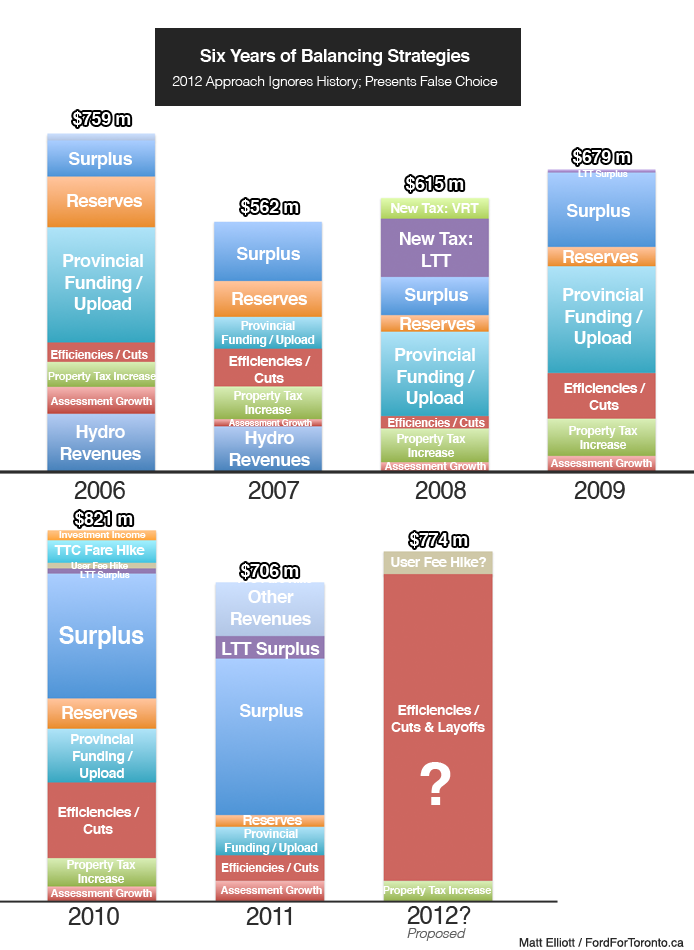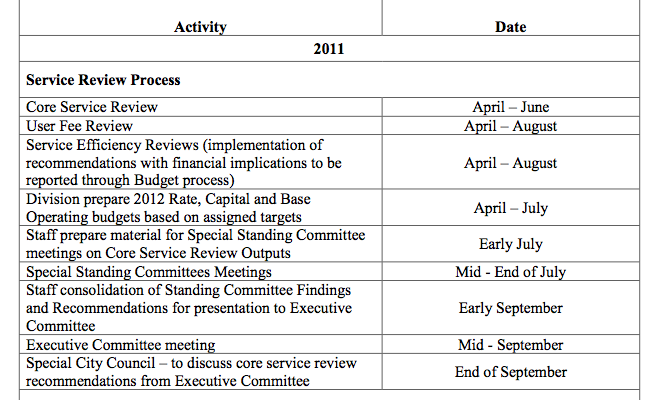Days after his landslide victory in the October 2010 election, mayor-elect Rob Ford returned to the AM radio station that had launched his political career into the stratosphere. With his electoral triumph still fresh, he told John Oakley — Ford calls him Johnny — about his ambitious plans for the city, starting with the immediate cancellation of the $60-a-year vehicle registration tax.
When Oakley asked how Ford planned to make up the revenue that would be lost after killing the tax, the new mayor was nonchalant. “It’s only $40 million,” he said. “There’s more than enough money. We have a major spending problem at City Hall, not a revenue problem.”
A lot has changed since then. Less than eighteen months removed from those comments, Ford faces a new reality: one where he wants things he can’t pay for. To deliver the subways he’s been promising, Rob Ford has got to deal with a revenue problem all his own.
And, funnily enough, he’s actually looking at things like a revived vehicle registration tax as a way to solve it.
The Globe & Mail’s Kelly Grant & Elizabeth Church:
It remains unclear how Mr. Ford intends to finance his subway plan without relying on road tolls and other new sources of revenue that he has adamantly opposed in the past. Several councillors confirmed that in private meetings the mayor has even floated the option of bringing back the vehicle-registration tax – and jacking up the annual fee to between $80 and $100 from the $60 charge that was killed last year.
Councillor Mary-Margaret McMahon said Mr. Ford mentioned a VRT of between $80 and $100 as he ticked off a list of possible revenue tools, including road tolls and parking levies, during a meeting last week with her and fellow centrist councillor Ana Bailao.
via After meeting developers, Ford claims unanimous support for subways | Globe & Mail.
This news follows a Globe editorial last week wherein the mayor — writing under his own byline — expressed initial support for a new tax on parking across the city. “According to KPMG, a modest parking levy could generate more than $90-million annually,” he wrote. “That would fund a public-private partnership model to build the Sheppard subway and generate ongoing revenue for future subway expansion.”
Looking closely, the mayor’s numbers are totally out of whack. A report released by the Toronto Parking Authority in 2007 pegged revenues for a city-wide annual levy of $25 applied to all off-street commercial parking spaces at about $23 million. A $100 levy applied only to parking spaces downtown would bring in even less: just $7.5 million. To generate the kind of dollars KPMG and the mayor are talking about — and, yes, you need those kinds of dollars to pay for expensive capital projects like subways — you’d be looking at a per-space levy of closer to $100 per year charged at all commercial properties across the city. (And that’s not even taking into account the displacement factor — commercial businesses would immediately slash the size of their parking lots in response to a new tax.)
In addition, the existence of new revenues doesn’t magically make the idea of subways on Sheppard and Finch any more sensible from a planning perspective. If Ford really wants to justify these projects, he needs to go beyond just raising the capital money and also provide a strategy for financing long-term operational and maintenance costs. Cutting bus routes to subsidize empty subways is not a strategy.
He also needs to tell the people in North York & Scarborough that their neighbourhoods will need to change to accommodate dozens of 40-story condo towers.
But I don’t want to sound like I’m down on the idea. That Rob Ford is actually having these kinds of conversations about revenue tools is monumentally good news. This is a major turning point for the mayor and for Toronto. Under a conservative regime, the city as a whole may finally be coming to terms with the fact that the budget process has been seriously constrained by limited revenue sources since amalgamation.
Former budget chief Shelley Carroll has been pointing out the need for new revenue drivers — including a sales tax — for years. It’s a relief that Ford-allies like Councillor Norm Kelly and the mayor himself are starting to come around to the idea.
Here comes the sun
But wait. The Toronto Sun editorial board:
The problem with new taxes is that they have a way of growing like topsy.
Within days of Ford floating his $90 million-a-year parking tax, key Ford council ally Norm Kelly was pitching a 0.5% Toronto sales tax to raise $250 million annually for new subways.
We can’t think of anything more off brand for Ford and his allies to be running up the flagpole than a new tax.
What about all that private sector enthusiasm for the Sheppard subway Ford’s been talking about?
What about the city living within its means?
via Ford should bury subway tax idea | Toronto Sun.
Oh, right. We can’t ignore this truth: Ford Nation hates taxes and fees. Sure, they’re also the ones being most vociferous about their demands for subways instead of cheaper alternatives, but can their collective desire for underground transit trump the anti-tax sentiment that was at the core of the mayor’s election campaign?
Early indicators say no.
So far, Ford hasn’t publicly endorsed any new revenues aside from the single mention of a parking levy in his Globe editorial. And even that was kind of hand-waved away in the next paragraph: “Some partnership models don’t require any taxpayer funding in the first few years,” he wrote.
Ford is at a tough political crossroads with the transit file, and I’m worried he’s likely to retreat. Without the bedrock support provided to him by outlets like the Toronto Sun and AM radio, the mayor’s bound to start feeling pretty lonely. On the other hand, these kinds of compromises and face-saving moves are the only workable strategy Ford’s got if he wants to continue to drive the agenda at council.
Council will be revisiting the idea of transit in the Sheppard corridor on March 15. The lead-up to that meeting is critical. If Rob Ford is serious about his plan for transit, he needs to make a clear public statement in support of new revenue tools. No weasel words, no call for studies, no vague requests to the province: if Rob Ford really wants underground transit, he has to tell us he wants new taxes and tolls.

